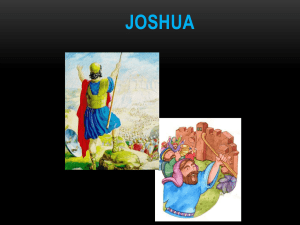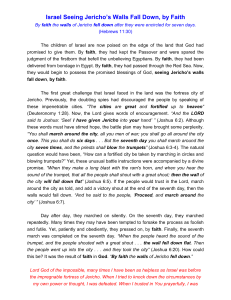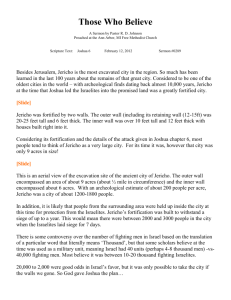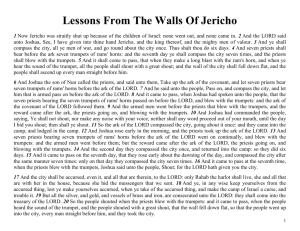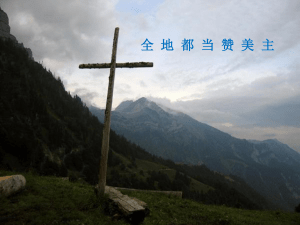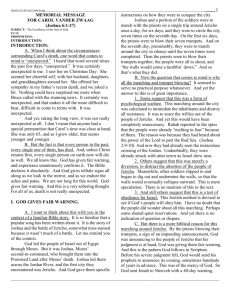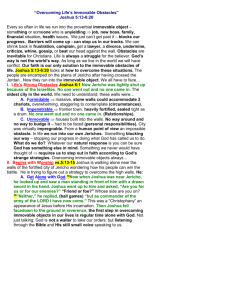FORWARD Bible Study: Week Five
advertisement
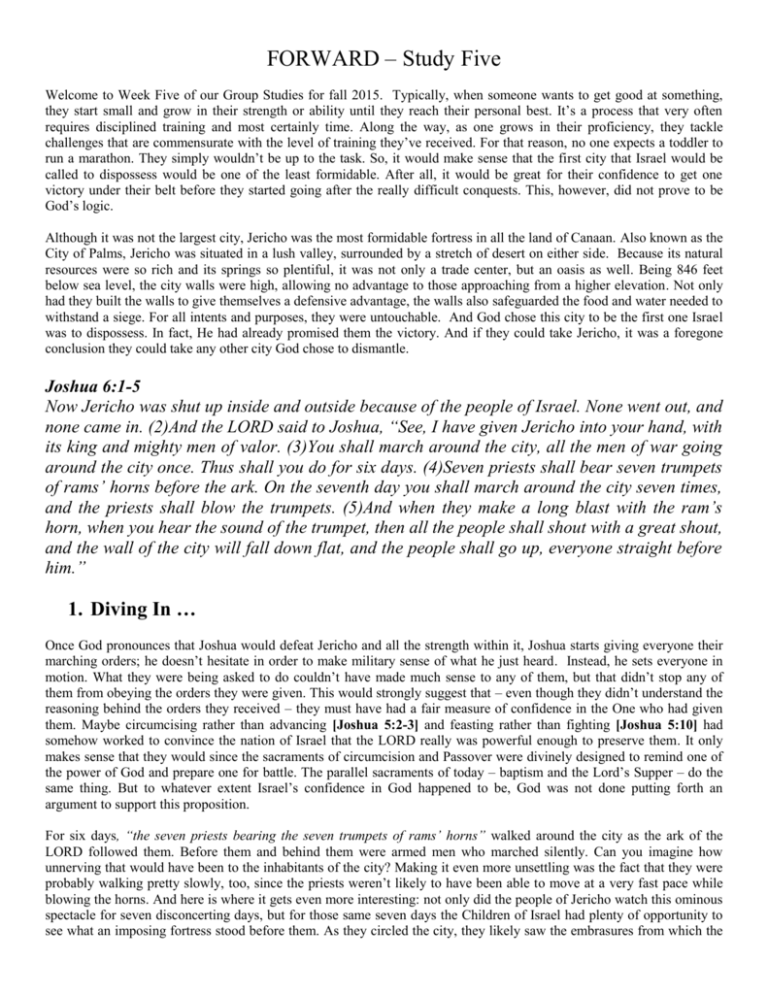
FORWARD – Study Five Welcome to Week Five of our Group Studies for fall 2015. Typically, when someone wants to get good at something, they start small and grow in their strength or ability until they reach their personal best. It’s a process that very often requires disciplined training and most certainly time. Along the way, as one grows in their proficiency, they tackle challenges that are commensurate with the level of training they’ve received. For that reason, no one expects a toddler to run a marathon. They simply wouldn’t be up to the task. So, it would make sense that the first city that Israel would be called to dispossess would be one of the least formidable. After all, it would be great for their confidence to get one victory under their belt before they started going after the really difficult conquests. This, however, did not prove to be God’s logic. Although it was not the largest city, Jericho was the most formidable fortress in all the land of Canaan. Also known as the City of Palms, Jericho was situated in a lush valley, surrounded by a stretch of desert on either side. Because its natural resources were so rich and its springs so plentiful, it was not only a trade center, but an oasis as well. Being 846 feet below sea level, the city walls were high, allowing no advantage to those approaching from a higher elevation. Not only had they built the walls to give themselves a defensive advantage, the walls also safeguarded the food and water needed to withstand a siege. For all intents and purposes, they were untouchable. And God chose this city to be the first one Israel was to dispossess. In fact, He had already promised them the victory. And if they could take Jericho, it was a foregone conclusion they could take any other city God chose to dismantle. Joshua 6:1-5 Now Jericho was shut up inside and outside because of the people of Israel. None went out, and none came in. (2)And the LORD said to Joshua, “See, I have given Jericho into your hand, with its king and mighty men of valor. (3)You shall march around the city, all the men of war going around the city once. Thus shall you do for six days. (4)Seven priests shall bear seven trumpets of rams’ horns before the ark. On the seventh day you shall march around the city seven times, and the priests shall blow the trumpets. (5)And when they make a long blast with the ram’s horn, when you hear the sound of the trumpet, then all the people shall shout with a great shout, and the wall of the city will fall down flat, and the people shall go up, everyone straight before him.” 1. Diving In … Once God pronounces that Joshua would defeat Jericho and all the strength within it, Joshua starts giving everyone their marching orders; he doesn’t hesitate in order to make military sense of what he just heard. Instead, he sets everyone in motion. What they were being asked to do couldn’t have made much sense to any of them, but that didn’t stop any of them from obeying the orders they were given. This would strongly suggest that – even though they didn’t understand the reasoning behind the orders they received – they must have had a fair measure of confidence in the One who had given them. Maybe circumcising rather than advancing [Joshua 5:2-3] and feasting rather than fighting [Joshua 5:10] had somehow worked to convince the nation of Israel that the LORD really was powerful enough to preserve them. It only makes sense that they would since the sacraments of circumcision and Passover were divinely designed to remind one of the power of God and prepare one for battle. The parallel sacraments of today – baptism and the Lord’s Supper – do the same thing. But to whatever extent Israel’s confidence in God happened to be, God was not done putting forth an argument to support this proposition. For six days, “the seven priests bearing the seven trumpets of rams’ horns” walked around the city as the ark of the LORD followed them. Before them and behind them were armed men who marched silently. Can you imagine how unnerving that would have been to the inhabitants of the city? Making it even more unsettling was the fact that they were probably walking pretty slowly, too, since the priests weren’t likely to have been able to move at a very fast pace while blowing the horns. And here is where it gets even more interesting: not only did the people of Jericho watch this ominous spectacle for seven disconcerting days, but for those same seven days the Children of Israel had plenty of opportunity to see what an imposing fortress stood before them. As they circled the city, they likely saw the embrasures from which the archers were probably perched. Still, they slowly continued walking around the wall, giving themselves plenty of time to imagine the dangers that could have been unleashed at any moment. And every day they lived to repeat the next day what they had done the day before. Discussion Questions: 1. How could spending so much time marching around the city actually build Israel’s confidence in God? 2. How do you think doing the unexpected could have prepared Israel to walk in obedience in the future? Has God ever asked you to do something you initially thought was unusual or strange? How did you respond to it? 3. Adversity can intimidate or it can embolden. What determines the effect adversity will have on you? 2. Connecting to Life … Joshua 6:16-17 And at the seventh time, when the priests had blown the trumpets, Joshua said to the people, “Shout, for the LORD has given you the city. (17)And the city and all that is within it shall be devoted to the LORD for destruction. Only Rahab the prostitute and all who are with her in her house shall live, because she hid the messengers whom we sent.” The order to kill all the people within the city (with the exception of Rahab and her family) is a tough one to process. After all, we’re talking about women and children here. But we’re also talking about a city that was host to rampant idolatry. And God was well within His rights to bring judgment upon the sin of Jericho. As Nate shared in his message, a culture can become so depraved that the only way to insure that any kind of positive future be possible, that culture must be wiped out. [Think about the flood and Noah.] There was no room in the Promised Land for any other gods than the True God; God had made this very clear [Exodus 20:2-6]. He had no tolerance for lives that could potentially lure the Children of Israel back to their irresolute ways. Taking possession of the land required that the land be cleansed, purged of its false gods and its pagan ways. This could not be done without destroying the people who embraced both. Devotion to God required complete rejection of anyone who was not in complete submission to Him. Discussion Questions: 1. How might this order serve to magnify God in the eyes of the nation of Israel? 2. How was this order a means of care for the people of Israel? 3. What difficult thing has God asked you to do that was for your good? 4. Their Canaanite spirit aligned the people of Jericho with the sins of the world. Today, the old man nature continues to align itself with the sins of the world. Because believers are to be aligned with Christ, have you ever had to purge sin from your life so that you, too, might have a future? What did that look like? 5. How serious is God about us maintaining right relationship with Him? 3. Consider This … Before they understand why God was asking them to walk around the city, Joshua and the Children of Israel agreed to follow through on the command to do it. Even though they were confident in God and His plan, they still had to be strong and courageous. Because the results were not immediate, but took seven days to realize, they had to remain faithful in the face of an imposing edifice. They had to expose themselves to their enemy and trust that God would protect them. They had to time their every step to the pace of the priests who heralded the presence of the LORD with every blow of the rams’ horns. To the people behind the wall, the sound of the horns must have been a death knell. But to Israel who stood in front of it, it was a constant reminder that the LORD was in their midst and they had nothing to fear. Discussion Questions: 1. The sound of the rams’ horns was encouragement to the nation of Israel while at the same time being a threat to the people of Jericho. What else do we find in the Bible that serves opposite agendas?
